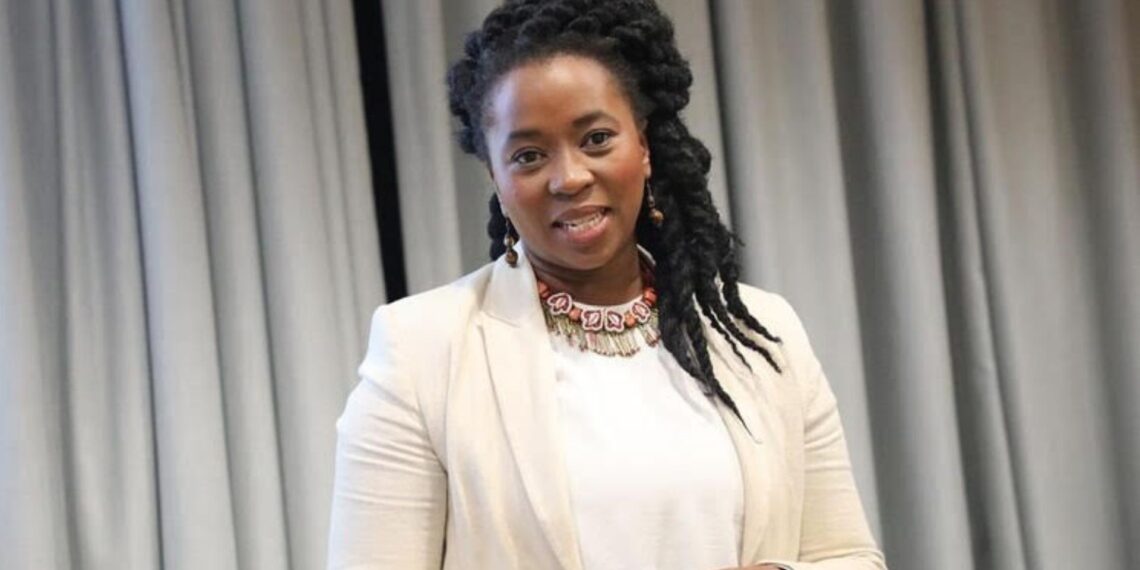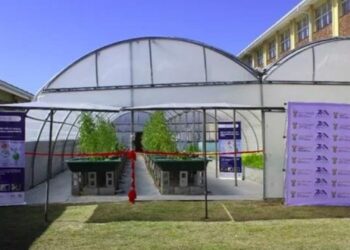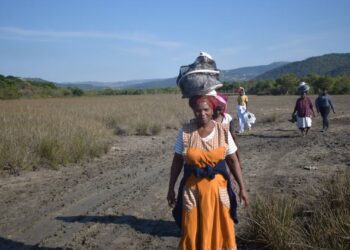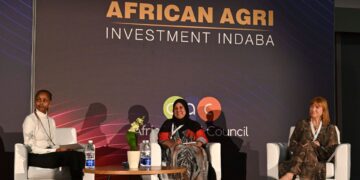Gauteng MEC for agriculture and rural development, Vuyiswa Ramokgopa, speaks out about how small-scale farmers can be supported so they can become sustainable and profitable when up against numerous challenges.
“We have to build models of financing and funding farmers that are actually more fit for purpose for the type of business they are in. But the nature of government procurement and budgeting cycles is that it’s one size fits all. Whether you are procuring laptops, or you’re procuring seeds, or you’re procuring government buildings, the rules are the same,” Ramokgopa told Daily Maverick.
Ramokgopa is an experienced entrepreneur and business leader with more than 15 years of experience across various industries. She took office as MEC in July 2024.
The majority of farmers in South Africa (SA) are small-scale or small farmers. Yet, they still face challenges in accessing markets, being able to export their goods and in basic infrastructure and inputs that can help them be economically viable.
“So if you look at farmers that are VAT-registered nationally (value-added production with an annual turnover that exceeds R1-million), you’ve got about 40 000, but there are about 200 000 plus that are not VAT-registered and therefore are often not counted statistically when we talk about the agricultural sector or when we make policy around it.
“In Gauteng, the dynamics are quite similar. You have approximately 2 400 so-called commercial farmers, but we actually have around 70 000 people or entities involved in farming activities. So that just gives you a sense to say we are actually solving for the majority of the industry when we talk about small-scale farmers,” said Ramokgopa.
Challenges hindering small-scale farmers
She explained the three biggest challenges that small-scale farmers face:
- Proper, sustainable financing. “That, for me, is a baseline. Agricultural activities need ongoing funding and financing. So they need to be able to access credit, preferably at low rates. They need access to loans and credit because the activities are seasonal. It’s every year.”
- In-kind support. “So whether it’s equipment, training, technology, research, those types of things to be able to improve their productivity levels, but also close gaps where they lack certain infrastructure or equipment.”
- Access to the market. Number three, which is really the kicker. “Constant and consistent buyers of their products. And the way that the industry is currently organised is that primarily, especially in the fresh-produce industry, the primary place of trade for small farmers is the fresh-produce markets, (such as) the Joburg Market,” said Ramokgopa.
Most smallholding farmers are not exporting and are not in mainstream retail because of the difficulties of compliance. Ramokgopa said compliance requirements in mainstream retail are often just too much of a burden for farmers. As are the volumes.
Related stories
- Backyard farms, blended finance, agri-parks top Gauteng budget
- Two neighbours grow fresh farming future in Gauteng
- South African Agricultural Awards 2025: Here’s what to expect
- Small farms, big impact: Get your tickets for agri climate summit
“You may be able to produce the best potatoes or the best tomatoes, but at the point when your buyer needs, you know, 50 000 tomatoes a week, you run into problems.”
These three categories are where the government aims to close these gaps.
“And I would say we are moderately effective in three of those areas, and I’m willing to be frank about that, to say there’s only so far that I believe the government can go or has gone in terms of what policy allows and where the policy currently sits.”
Most of the support offered by the department of agriculture to small-scale farmers is focused on point number two, which is in-kind support.
People apply for assistance with infrastructure, such as fencing, or a borehole, or they may need chicken houses to be erected so that they can farm chickens or poultry. They may need abattoirs or some kind of equipment to be able to slaughter their animals.
“We support some of those initiatives. We are also working with other players in the industry. So for example, we’ll sometimes engage with some of the retailers in understanding what their compliance requirements may be, so that we can then give technical support or training to farmers to help them better meet those standards, as well as other health and safety certifications that assist them to access the markets that they may want to get into.”
The department also assists with export certifications, as they are responsible for that area, especially for meat products.
Building profitability
Dr Langa Simela, business development manager at Absa AgriBusiness, told Daily Maverick that once a farmer begins to generate surplus and demonstrate operational consistency, they enter the next phase akin to secondary school education.
“Here, the enterprise still requires support, but is ready to engage with financing instruments that introduce basic credit discipline. Concessional finance – typically offered at below-market interest rates, with extended repayment terms and flexible collateral requirements – is best suited to provide backing without exposing the farmer to the full weight of commercial obligations.”
Simela said this enables the development of repayment discipline and cash flow management, while also signalling financial maturity to future lenders.
Boost for agripreneurs
“Structures may include subsidised soft loan facilities, government credit schemes, guarantee-backed instruments, and blended mechanisms where donor or public capital absorbs a portion of the risk. Critically, this stage should not be seen as a temporary workaround, but as an essential layer in the capital architecture.
“It allows agripreneurs to formalise their operations, deepen market relationships, and begin to assemble a documented financial track record that commercial lenders will later rely on. It is also where credit scoring models can begin to evolve – incorporating behavioural indicators and alternative data in ways that recognise progress and support structured transition,” Simela explained.
Simela said an agripreneur reaches tertiary level when the business achieves consistent output and builds stable commercial relationships, underpinned by a growing and predictable cash flow.
That is when access to credit from commercial lenders becomes more accessible because the enterprise’s financial profile will meet the lending requirements.
Agribusinesses from the ground up
“This kind of graduated approach is not about prolonging dependence; it is about sequencing risk in ways that build viable, credit-ready agribusinesses from the ground up. It anchors a more inclusive financial architecture that closes the structural gap defining the missing middle and enables more producers to transition into scalable agricultural enterprises.
“It also creates a more efficient use of developmental funds, ensuring that agripreneurs who demonstrate capability can advance to the next level, while freeing up resources to support other emerging ones,” said Simela.
Ramokgopa said the fiscal constraints they face not only make it impossible to support every person in need, but also result in aid that fails to help farmers progress from secondary level to graduation.
She acknowledged that some may be disappointed with the department’s reach or the kind of support they provide.
“Not to mention that our mandate is extremely broad. Commercialisation of small-scale farmers is but one piece of the work that we do as a department.
“We have an extensive programme on veterinary services as well, you would have seen with the FMT outbreaks and such. We have to spend a lot of money on vaccines. And so our mandate is not solely supporting small-scale farmers, it actually goes far beyond that. Which means we’re quite stretched in terms of the minimal resources that we have.
“And we rely solely on national government grant funding. We receive a grant from the national government, which is highly regulated, and it’s quite prescriptive about what it can be spent on,” said Ramokgopa.
Sustainable and profitable?
Ramokgopa emphasised that agri-finance needs to be ongoing until the enterprise is self-sustainable and profitable.
“It cannot be that you apply this year, you get seeds, and then we are gone. Because if you need seeds this year, you’re going to need them again next year. And the year after that, until you are profitable and standing on your own two feet, and able to buy your own seeds.
Gauteng MEC Vuyiswa Ramokgopa
“Now, the nature of how the treasury works and how budget cycles work is somewhat incompatible, really, with that process, because a person cannot have an evergreen contract.”
Ramokgopa said the process of having to reapply each year leaves behind some who may still need the support, making even the previous funding ineffective as the small scale is yet sustainable and able to flourish in the business.
“So every year, they need to reapply and reapply. So we have found that even though we may provide certain people with support, and there may be even those that are such, it often doesn’t go far enough because it’s a one-off. One-offs don’t account for ongoing maintenance.
“You know, you put up a tunnel in an agri park, three years later, that tunnel maybe has holes in it, there’s a hailstorm, or whatever who’s paying for that maintenance?
“We have to build models of financing and funding farmers that are actually more fit for purpose for the type of business they are in. So it makes it difficult, because we need to have seeds delivered to farmers by a certain time. After all, that’s the planting time. That’s the time they need to go to the ground. Now, if things are late, because your approvals came late, or because there was a delay in approvals of budgets, the earth or nature doesn’t wait for you,” said Ramokgopa.
“I think this is where we have to be able to be a lot more agile, as a government, and in how we provide support to farmers. I think the land bank certainly is one of the role players that has not yet been used to its fullest potential as a funding institution, simply because of the way that they are capitalised currently. They’re not actually able to provide those zero costs, zero-interest loans, etc, because they themselves are effectively capitalised from money that costs money, essentially,” said Ramokgopa.
“There’s reasons for why funds get disbursed the way they do in government, but I think we must admit where the shortcomings are for the industry,” concluded Ramokgopa.
- Additional reporting by Neesa Moodley. This story was first published by Daily Maverick.
READ NEXT: IFAJ Congress highlights women driving agri-change in Kenya

















